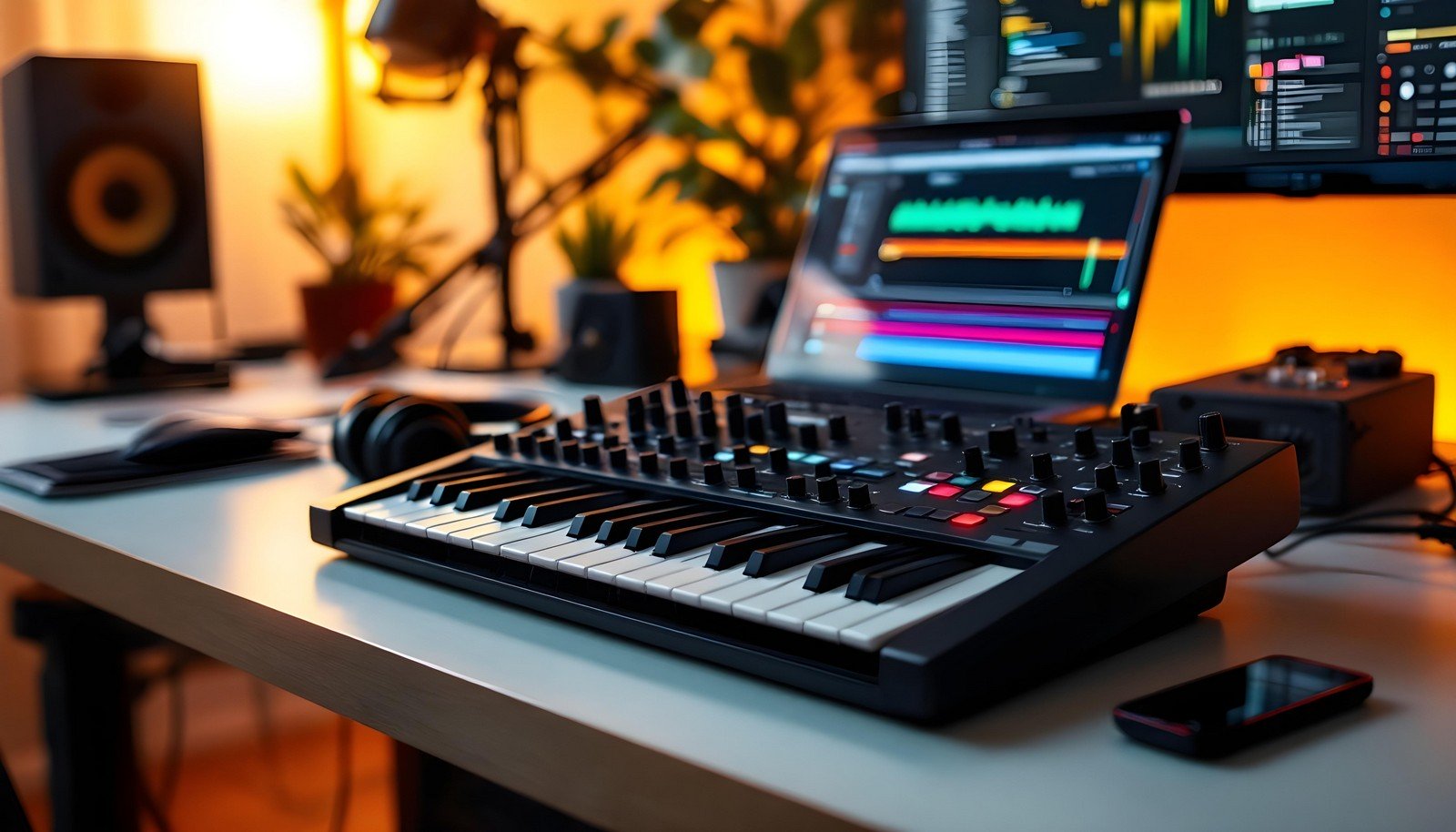MIDI Controller

Quick Navigation:
- MIDI Controller Definition
- MIDI Controller Explained Easy
- MIDI Controller Origin
- MIDI Controller Etymology
- MIDI Controller Usage Trends
- MIDI Controller Usage
- MIDI Controller Examples in Context
- MIDI Controller FAQ
- MIDI Controller Related Words
MIDI Controller Definition
A MIDI Controller is an electronic device used to send MIDI (Musical Instrument Digital Interface) signals to control sound modules, synthesizers, software instruments, and other music equipment. Typically, MIDI Controllers include keyboards, pads, or knobs and sliders that allow musicians to create, adjust, and manipulate sounds without generating audio directly. They serve as input tools that transmit performance data, such as pitch, velocity, or modulation, to external devices or software for playback or recording. Commonly used in music production, MIDI Controllers are key tools in modern digital audio workflows.
MIDI Controller Explained Easy
Think of a MIDI Controller like a remote control for music. It doesn’t make the music itself but tells other devices what notes to play, how loud to play them, or even how the sound should change. It’s like pressing buttons on a remote to change TV channels, but instead, you’re creating and controlling music.
MIDI Controller Origin
The first MIDI Controllers emerged in the early 1980s alongside the development of the MIDI protocol. They revolutionized music production by standardizing how electronic instruments and computers communicated, paving the way for the digital music age.
MIDI Controller Etymology
The term "MIDI Controller" combines “MIDI,” short for Musical Instrument Digital Interface, with “Controller,” indicating its role in controlling musical equipment and software.
MIDI Controller Usage Trends
Since the 1980s, MIDI Controllers have evolved significantly, gaining popularity in home studios and professional setups. The rise of digital audio workstations (DAWs) has made them essential tools for producers and musicians. With innovations in connectivity (USB, wireless) and compatibility with mobile devices, they’ve become more versatile than ever.
MIDI Controller Usage
- Formal/Technical Tagging:
- MIDI Protocol
- Music Production
- Digital Audio Workstation (DAW) - Typical Collocations:
- "MIDI keyboard controller"
- "USB MIDI controller"
- "pad-based MIDI controller"
- "DAW-compatible MIDI device"
MIDI Controller Examples in Context
- A MIDI Controller keyboard is used to play piano sounds in a recording session.
- Pad-based MIDI Controllers are often used by DJs to trigger beats or loops during live performances.
- Producers use knob-laden MIDI Controllers to adjust effects like reverb or equalization in real-time.
MIDI Controller FAQ
- What is a MIDI Controller?
A device that sends MIDI signals to control external audio hardware or software instruments. - Do MIDI Controllers produce sound on their own?
No, they only send performance data; sound is generated by connected devices or software. - What are some common types of MIDI Controllers?
Keyboards, pad controllers, and fader/knob controllers. - Can I use a MIDI Controller without a computer?
Yes, but it requires a MIDI-compatible device to produce sound. - What software works with MIDI Controllers?
DAWs like Ableton Live, Logic Pro, and FL Studio, among others. - Is a MIDI Controller necessary for music production?
While not mandatory, it simplifies the process of recording and manipulating MIDI data. - What’s the difference between a MIDI keyboard and a synthesizer?
A MIDI keyboard only sends data, while a synthesizer generates sound. - Do MIDI Controllers require external power?
Many are USB-powered, but some standalone models might need adapters. - Can beginners use MIDI Controllers?
Yes, they’re user-friendly tools, and many entry-level options are affordable. - Are wireless MIDI Controllers reliable?
Modern wireless options are increasingly robust, but latency can still be a factor.
MIDI Controller Related Words
- Categories/Topics:
- Music Technology
- Sound Design
- Audio Production
Did you know?
The first widely adopted MIDI Controller, the Roland MPU-401, debuted in 1983 and set the stage for integrating MIDI with personal computers. Today, MIDI Controllers range from simple one-octave keyboards to complex systems with dozens of control surfaces tailored for live performances and intricate studio productions.
PicDictionary.com is an online dictionary in pictures. If you have questions or suggestions, please reach out to us on WhatsApp or Twitter.Authors | Arjun Vishnu | @ArjunAndVishnu

I am Vishnu. I like AI, Linux, Single Board Computers, and Cloud Computing. I create the web & video content, and I also write for popular websites.
My younger brother, Arjun handles image & video editing. Together, we run a YouTube Channel that's focused on reviewing gadgets and explaining technology.



Comments powered by CComment